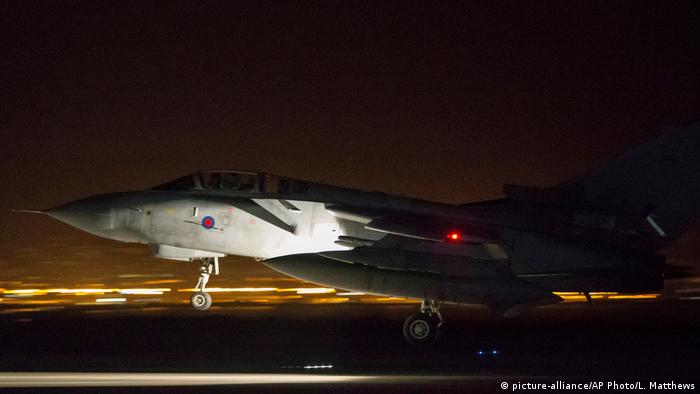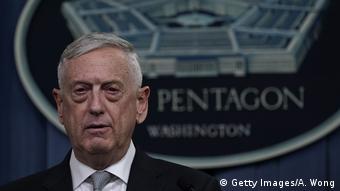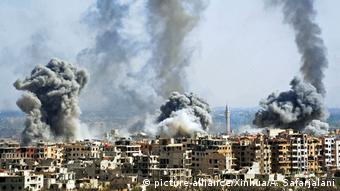US, French and British strikes on Syria have been limited to attempting to deter chemical weapons use. The action may be ineffective and could provoke an asymmetrical response from Syria and its allies, experts say.

The United States and its European allies launched airstrikes early Saturday on Syrian research, development and military facilities in response to an alleged chemical weapons attack near Damascus last weekend that killed at least 40 people.
The tripartite military action from the United States, France and Britain was designed to set back or destroy Syria’s chemical weapons program, the three countries said, and deter any further use in violation of international conventions. They stressed that the strikes were limited and not intended to signal a Western intervention in the Syrian civil war or an attempt at regime change.
“The purpose of our actions tonight is to establish a strong deterrent against the production, spread and use of chemical weapons,” US President Donald Trump said in a televised address. “We are prepared to sustain this response until the Syrian regime stops its use of prohibited chemical agents.”
In London, British Prime Minister Theresa May repeated that the military action was not about “intervening in a civil war” and “it is not about regime change.”
“It is about a limited and targeted strike that does not further escalate tensions in the region and that does everything possible to prevent civilian casualties,” she said.
Read more: Airstrikes in Syria: What you need to know
Limited military operation
Sam Heller, a senior analyst at the International Crisis Group, said the military action seemed intended as a limited, proportional and deterrent response against chemical weapons use.
“That is how these strikes were evidently planned in terms of the targets that were selected and also how they were communicated publicly, which seems to be uniformly in terms of chemical weapons deterrent, not more expansive political demands or some attempt at regime change,” he said.
Trump, who in recent weeks has signaled that the US may pull back its presence in northeast Syria after the defeat of the “Islamic State” (IS), said in his remarks that the United States was not seeking a permanent presence in Syria.
The military action came despite concern that it could have unintended consequences, including direct Western conflict with Russia, which backs the regime of Syrian President Bashar al-Assad and has troops at the Hmeimim air base and its naval facility at Tartus.
Read more: Russia demands UN Security Council condemn missile attack
Moscow said none of the more than 100 missiles targeted its bases and it did not activate its air defenses, despite threats earlier in the week that it would shoot down missiles and the platforms from where they were launched. Russia said Syrian air defenses shot down 71 out of 103 missiles, although that could not be confirmed independently, and the Pentagon said the strikes “successfully hit every target.”
Read more: What foreign powers want from the Syrian war
Enough to deter chemical weapons use?
It is unclear if the tripartite military action will have the desired effect of halting chemical weapons attacks. The Assad regime has repeatedly used chemical weapons, including chlorine and nerve agents, during the seven-year war, despite a 2013 deal brokered by the United States and Russia to remove Syria’s chemical weapons. Trump ordered 59 cruise missile launches in April 2017 on a Syria air base in response to a nerve agent attack in the rebel-held town of Khan Sheikhoun in northwestern Syria.
Read more: Opinion: Syrian airstrikes send a clear message
“The erosion of the norm (against chemical weapons use) has already taken place,” said Eran Etzion, a former Israeli deputy national security adviser. There is no reason to believe that the “overall erosion of the use of chemical weapons will change.”
Nicholas Heras, a Middle East Security Fellow at the Center for a New American Security, described Trump’s actions as a “dog and pony show.”

Secretary of Defense Jim Mattis said the strikes were a “one-time shot,” unless the Assad regime used chemical weapons again.
“The Trump administration literally slapped Bashar al-Assad on the wrist, and even worse, the Trump team seemed to justify al-Assad using non-chemical weapon means to win his war. As long as al-Assad does not use chemical weapons, he is good,” said Heras.
Joshua Landis, the director of the Center for Middle East Studies at the University of Oklahoma, said the United States had tried to look strong in a situation where it does not have much leverage, and seeks to leave Syria.
“Ultimately, what Trump is doing with these deterrence exercises is influencing a very narrow bandwidth within the Syrian civil war, which is the use of chemical weapons,” he said, pointing out chemical weapons attacks have killed an estimated 1,900 people in a war that has claimed half a million lives.
War running in Assad’s favor
The Western military response comes as the Syrian regime, backed by Russia and Iran, has largely turned the war in its favor, retaking large swaths of territory from rebels since Russia intervened in 2015.
This week, the Syrian regime retook full control from rebels of the Damascus suburb of eastern Ghouta, including Douma, where the alleged chemical weapons attack took place, after a two-month regime offensive.
“From the point of view of al-Assad, Iran and Russia, the real action of this war is happening on the ground and on the ground al-Assad is winning,” said Landis. “Syria and Russia have zero interest in escalating with America” at a time Washington is signalling it will pull back from Syria.
Read more: Opinion: A US pullback from Syria is a terrible idea
Both Russia and Iran decried what they called a violation of international law and Syria’s sovereignty, but it was unclear what, if any, response they would make. The reaction from Damascus and its backers following the 2017 US strike in Syria was muted despite repeated threats.
Asymmetric response
If there is a Russian, Syrian or Iranian response, it is likely to be indirect and asymmetrical, such as targeting or undermining the US presence in Syria or retaliating against its allies.
“There are certainly various asymmetric means through which Russia, Syria and Iran could respond inside Syria or outside,” said Heller.
The United States is vulnerable in northeastern Syria, where it has about 2,000 special forces deployed alongside the Syrian Democratic Forces (SDF), a mixed Kurdish and Arab force fighting IS and seeking to stabilize the northeast of the country. It also has troops in Iraq, where Iran-backed militias hold considerable sway.

Assad supporters rallied in Damascus and other cities to support the president and Russia. Radio claimed victory over the US and other enemies.
According to Heller, “there are ways the Syrian government and its allies can make it more difficult or less tenable for the US and its coalition to operate inside Syria,” including possibly Russia using its air defenses to limit US airpower.
“The lowest-hanging fruit for Bashar al-Assad and his allies is not to target the United States military directly in Syria, but to try to degrade the efforts of the Syrian Democratic Forces to govern in the wake of IS,” said Heras. “If al-Assad and his allies can weaken the SDF, they can crack the foundation of the US military’s planning for Syria.”
Threat of Israel-Iran conflict
Another potential response could be aimed directly or indirectly at Israel, which has carried out dozens of airstrikes in Syria targeting Iran and its Lebanese Shiite proxy Hezbollah. On Monday, suspected Israeli warplanes targeted Syria’s T-4 air base, drawing a rebuke from Russia and vows of retaliation from Iran.
Following Saturday’s US-led strikes, a top Russian defense official, Colonel-General Sergei Rudskoi, said Moscow may reconsider supplying Syria with S-300 surface-to-air missile systems to upgrade its aging Soviet-era anti-missile systems. Such a move would restrict Israel’s freedom to maneuver across Syria’s skies.
“It is reasonable to expect that Russia will limit the ability of Israel to exercise a similar attack in the future,” Etzion said, referring to the T-4 strike. “For the Russians, they don’t want to be seen as supporting direct confrontation with Israel, but do believe the higher profile of alleged Israeli attacks in Syria are an increasing concern for them.”
Israel has long warned it won’t allow an Iranian and Hezbollah entrenchment in Syria that could target Israel, raising concern about direct conflict between the two enemies that could spiral into a regional war.
DW RECOMMENDS
Airstrikes in Syria: What you need to know
France, the US and the UK have launched about 100 missiles at weapons facilities in Syria. Here’s how it happened, and how the world reacted. (14.04.2018)
Netanyahu warns Iran: ‘Do not test Israel’s resolve’
Israeli Prime Minister Benjamin Netanyahu has given a fiery speech at the Munich Security Conference, warning the world not to try to appease Iran. Iran’s foreign minister called his presentation “a cartoonish circus.” (18.02.2018)
Missiles fired at military airport in Homs: Syrian media
Syria and its main ally Russia have accused Israel of carrying out a missile strike that killed 14 people on a Syrian air base. It took place amid an international outcry over a suspected poison gas attack two days ago. (09.04.2018)
What foreign powers want from the Syrian war
The Syrian opposition and forces loyal to President Bashar Assad are not the only groups fighting in the conflict. Other countries have also intervened to pursue their own interests. (12.04.2018)
Opinion: A US pullback from Syria is a terrible idea
Donald Trump has said he wants the US military out of Syria. That would be a fatal misstep, writes Kersten Knipp. The US president would be handing the region over to players that would create even greater chaos. (02.04.2018)
Syria: US claims it has proof Assad regime behind Douma chemical attack
The State Department has said it has evidence the Syrian regime was behind last week’s chemical weapons attack on Douma. As Trump weighs his next move, the US has started moving ships to within striking range of Syria. (14.04.2018)
Opinion: Syrian airstrikes send a clear message
The good news is that World War III has not started. But the bad news is that nothing in Syria will be improved by Western powers’ airstrikes, writes Christian F. Trippe. (14.04.2018)
US, UK, France launch strikes on Syrian chemical weapons capabilities
In retaliation for a chemical weapons attack in Douma, US President Donald Trump has said the US military launched strikes on Syrian chemical weapons capabilities. Russia has warned of “consequences” for the strikes. (14.04.2018)
Russia demands UN Security Council condemn Syria missile attack
Russia has called an emergency Security Council meeting to file a motion condemning the missile attack on Syria. The motion is unlikely to pass. (14.04.2018)









